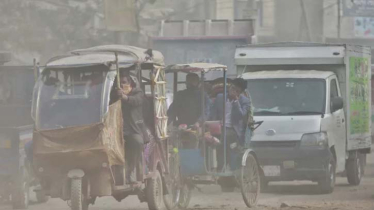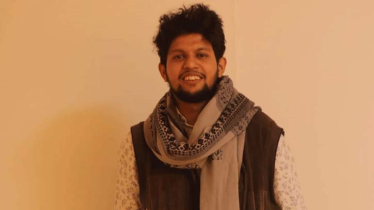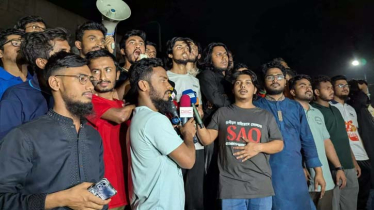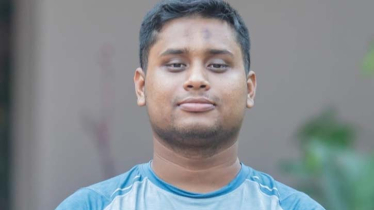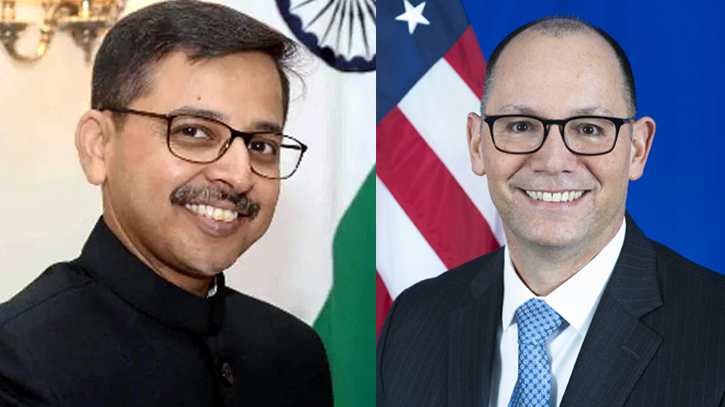
Photo : Collected
While the streets of Dhaka continue to witness increasing violence amid sheer political standoff between the ruling and opposition camps over the ensuing parliamentary polls in the country, US Ambassador to Bangladesh Peter Haas has quietly flown to the Indian capital to confer with American Secretary of State Anthony Blinken, who is currently visiting New Delhi for the '2+2 Dialogue' with his Indian counterparts.
Indian High Commissioner to Bangladesh Pranay Verma, too, has flown to New Delhi – thereby setting abuzz the rumour mill among the political and diplomatic circle about the outcome of the apparently crucial New Delhi meet.
Meanwhile, Indian Foreign Secretary Vinay Mohan Kwatra said that as far as Bangladesh is concerned, India has shared its "perspective very clearly" in the 5th India-US 2+2 Ministerial Dialogue in New Delhi on Friday.
"We did discuss very extensively regional issues and so far Bangladesh is concerned, we shared our perspective very clearly in the dialogue," he told a post-dialogue press briefing in New Delhi in the afternoon when Indian Defence Secretary Aramane Giridha and MEA Spokesperson Arindam Bagchi, among others, were present.
When asked whether recent political developments and election issues in Bangladesh were discussed in the dialogue, Kwatra said, "It is not our (India) space to comment on the policy of a third country...the election in Bangladesh is their internal matter and it is for the people of Bangladesh to
decide their future".
He continued, "We as a close friend and partners of Bangladesh, we respect the democratic process in Bangladesh and will continue to support the country's vision of a stable, peaceful and progressive nation".
However, diplomatic sources said Peter Haas has been the constant focus of attention for the Bangladesh media, political elite and civil society for being overcritical of how Bangladesh under the ruling Awami League (AL) regime conducts elections, which he feels are rigged and do not provide a level playing field to the opposition.
The election process for the next parliament, as per the Bangladesh constitution, has to be completed by January 28th next year and Bangladesh’s Chief Election Commissioner (CEC) in his meeting with President Sahabuddin on Thursday informed about its readiness to conduct the elections on time.
However, the Election Commission’s failure to hold peaceful by-election, which is of much smaller scale, in the recent past has raised questions about its claims of being nonpartisan and fair.
US top diplomat Anthony Blinken after completion of his crucial visit to the war-torn Arab region flew to Japan to confer with his partners in the Far East, upon which he has reached New Delhi along with US Defence Secretary Llyod Austin for the 2+2 Ministerial Dialogue with close strategic ally India.
However, analysts are of the view that the arrival of US Ambassador Peter Haas to New Delhi during the Blinken visit is not mere coincidence and reliable sources have indicated that Bangladesh, which is the closest ally and stable partner of the incumbent Modi government in South Asia, is very much high-up in the agenda.
External Affairs Minister Dr Subramanyan Jaishankar and National Security Adviser Ajit Doval have reportedly conferred on the current situation in Bangladesh, the stability of which is crucial to India especially because of India’s close historical relationship with Prime Minister Sheikh Hasina and the ruling Awami League.
However, since the past one year several European countries, Australia, Canada, and Japan, led apparently by US Ambassador in Dhaka Peter Haas, have raised the ante and have publicly stated that the forthcoming parliamentary elections shall only be considered valid and recognised by the international community if it is free and fair and conducted as per the tenets of the constitution.
Prime Minister Sheikh Hasina (78), the longest serving woman prime minister in the world, is set to complete her third continuous term next month. Her government is naturally facing anti-incumbency factors, which have been compounded by rising cost of living propelled by inflation. This has led to many sections of the country – especially the garment workers taking to the streets recently demanding higher wages. The opposition parties, too, are complaining of pre-election crackdown on false charges leading to full prisons.
Amidst such a complicated scenario, India, whose stakes in Bangladesh is much higher than the West, has till date maintained a stoic silence except once when, Arindam Bagchi, the Spokesperson of the Ministry of External Affairs, when questioned, spoke in favour of free and fair elections in its eastern neighbour.
Experts and Bangladesh observers in India, therefore, consider Friday's meeting between India and the US to be extremely crucial as it will set the agenda and direction of the course that politics in Bangladesh will take in the coming days.
For India, much is at stake as Bangladesh plays a major role in maintaining peace and stability in its northeast besides being a major trading partner and its relations with the opposition political parties of Bangladesh – especially BNP and Jamaat-e-Islami has always been riddled with tension.
Messenger/Disha





